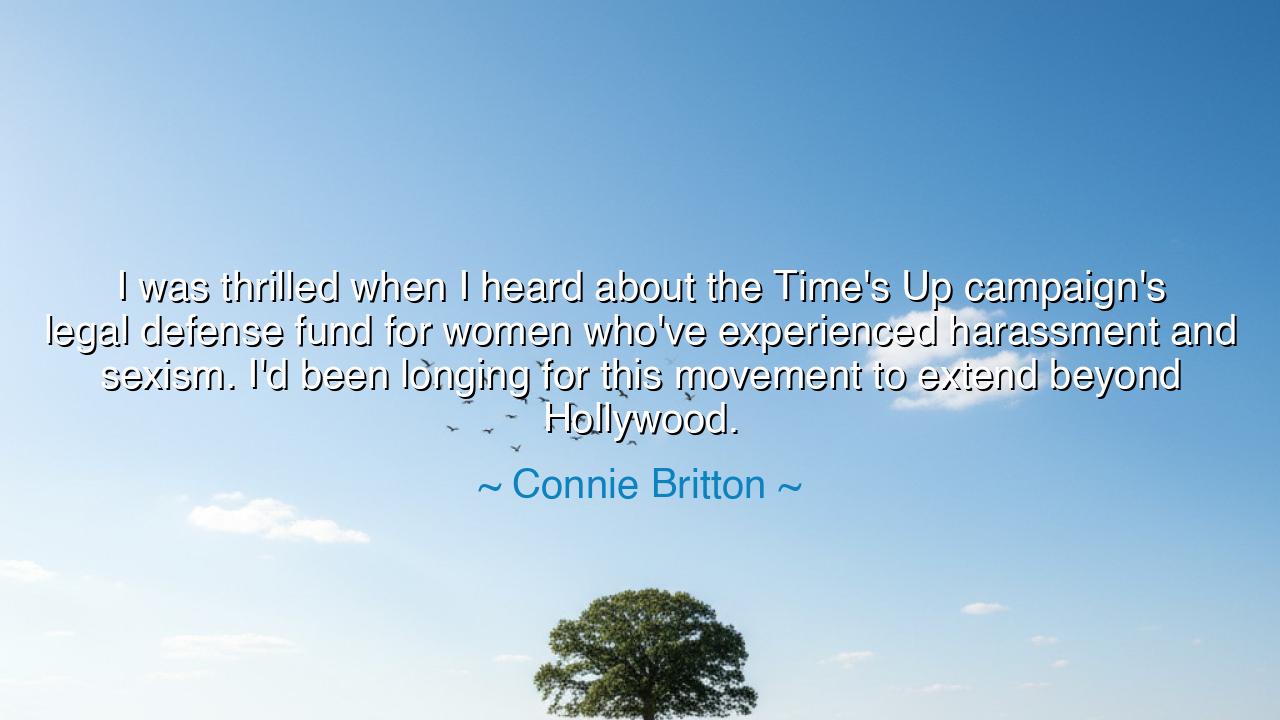
I was thrilled when I heard about the Time's Up campaign's legal
I was thrilled when I heard about the Time's Up campaign's legal defense fund for women who've experienced harassment and sexism. I'd been longing for this movement to extend beyond Hollywood.






“I was thrilled when I heard about the Time’s Up campaign’s legal defense fund for women who’ve experienced harassment and sexism. I’d been longing for this movement to extend beyond Hollywood.” Thus spoke Connie Britton, the actress and advocate whose words carry the warmth of empathy and the fire of justice. In this statement, she gives voice to a truth both ancient and enduring—that a movement for dignity cannot be confined to one sphere of life, nor reserved for the privileged few. Her excitement, her “thrill,” is not born merely from admiration, but from hope realized—that the cries of women silenced by fear and oppression might at last be heard, not only on screens and stages, but in every corner of society.
The Time’s Up campaign, born in 2018 from the echoing power of the #MeToo movement, was more than a gathering of voices—it was the forging of an instrument of change. Women in the entertainment industry, long silenced by contracts, careers, and coercion, rose up and said “enough.” But Britton’s words remind us that even as these voices found their strength, there were millions of others—farmworkers, waitresses, teachers, nurses, factory workers—whose pain was no less real but whose platforms were far smaller. Thus, when she heard of the legal defense fund, designed to provide financial and legal aid to women across industries who suffered harassment and sexism, she saw what so many had long prayed for: the extension of justice beyond fame, beyond privilege, into the fields, offices, and factories where the silent endured their burdens unseen.
Connie Britton, known for her grace and strength both on and off the screen, has often used her voice to speak for those whose own were muted. Her longing for the movement to “extend beyond Hollywood” carries profound significance. For she knew that every great struggle for equality falters when it forgets the poor and the powerless. In her words lies the wisdom of a principle as old as civilization itself: that justice, to be true, must be universal. A victory for one woman in the spotlight means little if it does not kindle hope for the woman working late in the dark, afraid to speak. To Britton, the Time’s Up fund symbolized that long-overdue bridge between visibility and inclusion—a chance to transform compassion into structure, empathy into law.
In the ancient world, too, the cry for justice often began among the powerful before it reached the people. In the courts of Athens, laws were written for the freeborn but not for the enslaved; in Rome, women could own property, yet their voices were confined to the household. But every age has its reformers, those who dared to widen the circle of dignity. Consider the story of Hildegard of Bingen, a medieval nun and scholar who defied her age by preaching and writing boldly on faith, science, and the equality of souls. Though cloistered, her courage echoed through centuries, inspiring countless women to find strength within silence. Britton’s yearning mirrors this same spirit: the desire that the movement for equality not remain locked within marble halls or gilded studios, but flow outward like a river of justice, nourishing all who thirst for dignity.
Her quote also speaks to the power of collective action. A movement confined to celebrity risks becoming spectacle; a movement shared with the people becomes revolution. By celebrating the Time’s Up legal defense fund, Britton honors those who give their skills, their resources, and their courage to protect the vulnerable. She recognizes that true progress is not achieved when the strong stand apart, but when they stand beside the weak. For in solidarity lies strength greater than any individual fame—a truth that the ancients knew well when they spoke of the polis, the city of citizens, bound not by wealth or birth, but by shared responsibility.
And yet, there is tenderness in her words—a longing that reveals the wound of inequality still unhealed. The legal fund, though powerful, is but a beginning. Its existence points to how far society must still travel: for every woman who receives aid, many more suffer unseen. Thus, Britton’s statement is both celebration and summons—a call to those who live in comfort to extend their compassion into action, to use their influence as shield and sword for those without such armor. The movement must not stop where the cameras end, she reminds us; it must reach the fields, the factories, the unseen workplaces where power still silences truth.
The lesson, then, is both clear and sacred: justice cannot be partial, and freedom cannot be exclusive. When one woman is silenced, all women are less free; when one is defended, all gain strength. Let every generation remember that the law, to be righteous, must serve the voiceless, and that movements born in light must reach those still in shadow. Support organizations that defend the vulnerable. Speak for those who fear to speak. Use privilege as a weapon of mercy, not distance.
So remember, children of the future, the wisdom of Connie Britton: that the triumph of the few means nothing if it does not awaken liberation for the many. The struggle for equality must move beyond the walls of power, into the streets, the homes, and the hearts of all who yearn for dignity. Let the flame of movements like Time’s Up not flicker as a moment of outrage, but burn as an eternal torch—guiding a world where every woman, in every place, may stand upright, unafraid, and unbroken beneath the sun of justice.






AAdministratorAdministrator
Welcome, honored guests. Please leave a comment, we will respond soon